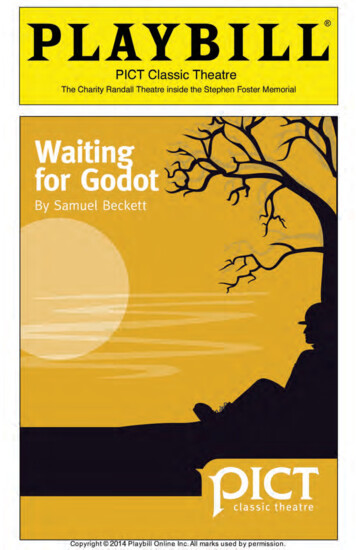
Transcription
NEVER UNDERESTIMATETHE POWER OF A GREATPERFORMANCE.UPMC is proud to support the PICT Theatre.Affiliated with the University of Pittsburgh School of Medicine,UPMC is ranked among the nation’s best hospitals by U.S. News & World Report.
PICT Classic TheatrepresentsWaiting for Godotby Samuel BeckettDirected by Aoife Spillane-HinksKen Bolden*James FitzGerald*Martin Giles*Alan Stanford*Shay FreundElliot PullenScenic/Co-Costume DesignerAlan StanfordCo-Costume DesignerLindsay TejanTechnical DirectorJesse Van SwolScenic Charge ArtistJennifer KirkpatrickCo-Lighting DesignersCindy LimauroChristopher PopowichProps MasterJohnmichael BohachMaster ElectricianKeith A. TrauxAssistant Master ElectricianRegina TvaruzekProduction ManagerGeorge DeShetler, Jr.Stage ManagerCory F. Goddard*Assistant Stage ManagerConnor BahrMaster CarpenterSamuel KarasDramaturgTyler CrumrineWaiting for Godot is presented by special arrangement withSAMUEL FRENCH, INC.PICT Classic Theatre has received permission from Edward Beckett to use theversion (script) of Waiting for Godot as edited by Samuel Beckett for the Schillerproduction and used by the Gate Theatre (Dublin) and in the Beckett on Film series.*Member of Actors’ Equity Association, the Union of ProfessionalActors and Stage Managers in the United States.
CASTEstragon. Martin Giles*Vladimir. James FitzGerald*Pozzo. Alan Stanford*Lucky. Ken Bolden*A Boy. Elliot Pullen or Shay FreundPLACE: A country road, a rock, and a treeTIME: 1950WAITING FOR GODOT WILL BE PERFORMED IN 2 HOURS AND15 MINUTES INCLUDING ONE 15-MINUTE INTERMISSION*Member of Actors’ Equity Association, the Union of ProfessionalActors and Stage Managers in the United States.The use of any recording device, either audio or video, and the taking of photographs,either with or without flash, are strictly prohibited. Please turn off all electronic devicessuch as cellular phones, beepers, and watches.
LETTER FROM THE BOARD PRESIDENTTo our guests,Welcome to our show. I'm delighted that you did not wait to see it!From childhood we are taught that "patience is rewarded." We must wait fordessert until after we eat our vegetables. We can't go outside to play until wepractice the piano. We have to wait to grow tall enough to ride the big rides atKennywood. We have to wait until Christmas morning to find out what Santabrought us.One Christmas, my brother and I decided not to wait. We went hunting in thehouse to find the presents that Santa might have already dropped off before thebig day. And we found the treasure trove up in the attic! It seemed exciting; wewere so clever. But Christmas Day lacked the surprise and suspense; not soexciting. So the next year, we waited.Some things are worth waiting for: finding the love of our life to marry; expectingthe arrival of a child; saving for the perfect house to buy. Patience does pay off.At PICT, however, we are in our teen-age years. We want some things now! Weare impatient for a theatre that is easily accessible to all and that we can callour permanent home. We are investigating options— we ask for your patience,ideas, and support.We are also impatient to grow and meet new patrons. We want to fill every seatat every show. So, we ask you not to wait! Please tell your friends, colleaguesand other organizations why they should not wait to see PICT in action. Godotmight not arrive for the show, but everyone who loves classic theatre should.Sincerely,Chuck Moellenberg
PRODUCTION TEAMDirector. Aoife Spillane-HinksCo-Costume Designer & Scenic Designer. Alan StanfordCo-Costume Designer. Lindsay TejanCo-Lighting Designer. Cindy LimauroCo-Lighting Designer. Christopher PopowichResident Stage Manager. Cory F. GoddardAssistant Stage Manager. Connor BahrProduction Manager. George DeShetler, Jr.Technical Director. Jesse Van SwolProps Master. Johnmichael BohachMaster Electrician. Keith A. TrauxAssistant Master Electrician. Regina TvaruzekMaster Carpenter. Samuel KarasScenic Charge Artist. Jennifer KirkpatrickDramaturg. Tyler CrumrineWardrobe Mistress. Emmi VeinbergsLighting Board Operator. Chris NorvilleSPECIAL THANKS: Sara Steelman, Mayor Bill Peduto, DavidWhalen, Todd Brown, Carnegie Mellon School of Drama, BarryMcGovern, Maeve Fitzgerald, John Duddy and City Theatre.
WHO'S WHO IN THE CASTKen Bolden (Lucky) is in his fourth season at PICT. PICTcredits: Basil Hallward in The Picture of Dorian Gray, theensemble in Julius Caesar, Mardian in Antony and Cleopatra,and Major Ross in Sherlock Holmes and the Crucifer of Blood.Pittsburgh Credits: Pittsburgh Public Theater, City Theatreand Quantum Theatre. Film credits: Sorority Row and Fathersand Daughters. Upcoming: Tamara (Quantum Theatre) andThe Small Room at the Top of the Stairs (Off the Wall). He isa grateful member of Actors' Equity Association and SAG/AFTRA.James FitzGerald (Vladimir) is a featured artist for the 2014Season and is in his thirteenth production for PICT. OtherPittsburgh credits: Charles Ives in Charles Ives Take MeHome (City Theatre), End of the Affair and Mouth to Mouth(Quantum Theatre), 1776, Royal Family, Born Yesterday,Midsummer Night's Dream, and Our Town (Pittsburgh PublicTheater), Candide (Opera Theatre), and Heads (PittsburghPlayhouse). Chicago credits: Marriot's Lincolnshire Theater,Chicago's Second City, ETC., The Royal George, Apple Tree,and other Chicago venues including 16 seasons with ChicagoShakespeare Theater. Regional credits: Cape May Stage, Milwaukee Rep, the NebraskaShakespeare Festival, North Carolina Shakespeare Festival, and Baltimore ShakespeareFestival. Off Broadway: Rose Rage, directed by Edward Hall. Awards: Recipient of twoJoseph Jefferson Awards (Best Supporting Actor), a Jeff Citation (Best Actor), and an OEAward Nomination (Best Supporting Actor).Shay Freund (A Boy) is in his first season at PICT. Herecently won best monologue in the lower division of thePittsburgh Public Theatre's Shakespeare Monologue & SceneContest for his portrayal of Flute (as Thisbe) in A MidsummerNight's Dream. Shay will be in the sixth grade and attends theGideon Study Center. Shay also stays busy with Boy Scouts,swimming, and church. He is excited to be performing at PICTClassic Theatre and he thanks God for his family and many,Your Generosity Ensures that PICT Theatre can Continue to ProvideHigh Quality, manyThought ProvokingTheatre that Stirs the Soul.blessings!The Giving TreeThe Giving TreeSelect a Tag from the TreeTags Represent Giving Levels Ranging from 50 - 500Giving Levels Represent Support of the VariousEducational, Professional and Artistic Programs andServices that PICT Theatre Needs to SurviveYour Generosity Ensures that PICT Theatre can Continue to ProvideFill out a Donor Form and Envelope withHighYourNameQuality,and PaymentThoughtInformationProvoking Theatre that Stirs the Soul.Please visit our Giving Tree whenattendingWe CouldNot Exist PICTWithout theevents and give a giftSelect for.a Tag from the TreeGenerous SupportofDonorsYou!been hopingthat PICTLikehasTags Represent Giving Levels Ranging from 5Giving Levels Represent Support of the Va
WHO'S WHO IN THE CASTMartin Giles (Estragon) is in his thirteenth season with PICT.PICT credits: he directed A Skull In Connemara, performedin Lady Windermere's Fan, The Kreutzer Sonata, The GigliConcert, Uncle Vanya, and Beckettfest, and wrote and directedBeautiful Dreamers. Other credits: last year he directed JohnGabriel Borkman and Parlour Song, acted in Dream of Autumn(Quantum Theatre). Awards: 2002 Post-Gazette Performer ofthe Year. Martin has taught acting at Carnegie Mellon University,Point Park University and Ohio University.Elliot Pullen (A Boy) is in his first season at PICT. Credits:Wally Webb in Our Town (Pittsburgh Public Theater), CharlieBucket in Charlie and the Chocolate Factory (Little LakeTheater), The Tempest (Pittsburgh Shakespeare in the Park),Young Company Ensemble, and various performances withPittsburgh Youth Shakespeare Troupe Falstaff’s Fellows.Awards: 2012 finalist, 2013 honorable mention, and 2014 winnerof Pittsburgh Public Theater's Shakespeare Monologue & SceneContest (lower division scene). Elliot is 12 years old, and he isa homeschooled sixth grader from Mt. Lebanon. He would liketo thank his family, friends, and theatre mentors for their love,support, and encouragement.Aoife Spillane-Hinks (Director) is in her second season atPICT. PICT credits: Our Class. Other credits: Broken PromiseLand (RTE Drama on One and national tour), Marvel (ProjectArts Centre), Opera Slam: Die Fledermaus (Project ArtsCentre), Be Not Afraid of Greatness, and Document (AbbeyTheatre Community and Education), The King’s Feet (ChalkTalk Theatre/Dublin Fringe Festival), The Yellow Wallpaper(Then This Theatre), Plaza Suite (Rough Magic), Hamlet(Second Age), and Boston Marriage (Gate Theatre). Aoife holdsa BA from Harvard University and an MA in drama and theatrestudies from NUI Galway. She is co-founder of Then This Theatre.Alan Stanford (Pozzo/Costume Designer/Scenic Designer) isin his seventh year at PICT. He was for more than thirty yearsa principal and leading actor with the renowned Gate Theatre,Dublin, where he recently directed his adaptation of Pride andPrejudice. He founded Ireland's Second Age Theatre Company.PICT credits: Blithe Spirit, Don Juan Comes Back from theWar, Lady Windermere's Fan, and The Kreutzer Sonata. Othercredits: The School for Scandal (Point Park Conservatory),works by Shakespeare, Molière, Noël Coward, Oscar Wilde,Shaw, Beckett, and Brecht.
WHO'S WHO ON THE PRODUCTION TEAMConnor Bahr (Assistant Stage Manager) is in his first season at PICT. Regional credits:Catch Me If You Can, The Courier, Infinite Ache and Waiting For Godot. Education: PointPark University. Thank You: Justin Fortunato, Robert Neumeyer, Aoife, Alan, James,Marty, Ken, Cassidy, and Cory.Johnmichael Bohach (Props Master) is now in his second season with PICT as propsmaster and has also provided the set designs for Blithe Spirit and Sherlock Homes and theCrucifer of Blood. Other design credits: The Devil's Arithmetic, The Importance of BeingEarnest, Turn of the Screw, The Great Gatsby, The Elephant Man, The Glass Menagerie,and Tuesdays with Morrie, (Prime Stage); Riders to the Sea, Lizbeth, and Three Decembers(Microscopic Opera) and Letters to Sala, Tartuffe, Bare, and Jekyll & Hyde (StagedoorManor, Loch Sheldrake, NY). Johnmichael is a graduate of the University of Pittsburgh withBAs in theatre arts and architectural studies. www.jmbsetdesigns.comTyler Crumrine (Dramaturg) is in his first season at PICT. He is a Pittsburgh-baseddramaturg and the editor of Plays Inverse Press, a small press publishing company fordramatic literature. His writing on Irish playwright Martin McDonagh has been recognizednationally by the John F. Kennedy Center for the Performing Arts, where he has alsostudied as New Play Dramaturgy Intensive fellow. His most recent work has appeared in theeducation and accessibility materials for Pittsburgh's City Theatre.George DeShetler, Jr. (Production Manager) is in his third season at PICT. He beganat PICT as the props master in 2012 and came on in July 2013 as production manager.Other Pittsburgh credits: Production manager at Prime Stage Theatre and temporarystaff carpenter at CMU School of Drama. Regional credits: Arena Stage, ImaginationStage, Contemporary American Theater Festival, and Indiana Repertory Theatre. Georgegraduated from Otterbein College in Westerville, Ohio, with a BFA in theatre design andtechnology.Cory F. Goddard (Resident Stage Manager) is in his tenth season with PICT. PICT credits:Heartbreak House, Stuff Happens, Lieutenant of Inishmore, House & Garden, Salome, Inthe Next Room or the vibrator play, and the Beckett, Synge, Pinter, and Chekhov Festivals.Other Pittsburgh credits: Quantum Theatre, Bricolage, Kelly Strayhorn Theater, and TheREP. Cleveland credits: Parade, The Laramie Project, Grey Gardens, and the non-Equitypremieres of Brooklyn, Phantom of the Opera, and [title of show]. Cory is a graduate ofBaldwin Wallace College. He would like to thank Rebekah, George, Vicky, Phill, Alicia,Liz, and the Wetness.Dr. Stephen Guinn (Article Contributor) is an organizational psychologist and author ofmore than 25 articles and book chapters on applying organizational psychology to business.He is pleased to contribute to the conversation about Waiting for Godot, one of his favoriteplays.
Proud toSupportGreat Theatrein Pittsburgh
WHO'S WHO ON THE PRODUCTION TEAMJennifer Kirkpatrick (Scenic Charge Artist) is in her second season at PICT. PICTcredits: Sherlock Holmes & the Crucifer of Blood, A Skull in Connemara, Don Juan ComesBack from the War, and Lady Windermere's Fan. Other credits: scenic artist for Livesof the Saints, and You Can't Take It With You (Carnegie Mellon University), and scenicartist for Stage Door (Lincoln Park Performing Arts Center). Jennifer is a graduate of OhioUniversity with a BFA in production design and technology.Samuel Karas (Master Carpenter) is in his first full season at PICT Classic Theatre. PICTcredits: PICT intern 2011, Young Katurian in Pillowman, and Lucius in Julius Caesar.Academic credits: scenic designs for The Fantasticks, Noises Off, and The Best ChristmasPageant Ever. He is also acting as the Technical Director for Opera Theater of Pittsburgh forthe 2014 Summer Festival. Samuel graduated from California University of PA with a BA intheater and a BS in technology education.Cindy Limauro (Co-Lighting Designer) designs for opera, theatre, dance, and architecture.PICT credits: Sherlock Holmes & the Crucifer of Blood, Garden (part of House &Garden), Antony and Cleopatra, Pride and Prejudice, The Shaughraun, School for Scandal,Heartbreak House, Henry IV, The Dead, Travesties, A Woman of No Importance, and theworld premieres of Beautiful Dreamers and Henry. Other credits: Aida, Madama Butterfly,La Traviata, Falstaff, La Boheme, Samson & Dalila, The Magic Flute, Tosca, Fidelio,Carmen, and Lucia di Lammermoor for Pittsburgh Opera, La Traviata (Baltimore Opera),Turandot, The Threepenny Opera, La Boheme, and the world premiere of Pasatieri's TheThree Sisters (Opera Columbus). With her design partner in C & C Lighting, ChristopherPopowich, she has designed the new lighting for the Gulf Tower Weather Beacon as well asthe award-winning lighting designs for the Randy Pausch Memorial Bridge and the HuntLibrary. She is Professor of Lighting Design at Carnegie Mellon School of Drama.Christopher Popowich (Co-Lighting Designer) is in his sixth season at PICT. PICTcredits: A Skull in Connemara, Julius Caesar, End Game, and the Beckett Festival andEmpire Series. Regional credits: Madame Butterfly (Columbus Opera), Wagner's RingCycle (Opera Theater of Pittsburgh), and Henry V on a Trapeze (Burning Coal TheaterCompany). Other Projects: The Randy Pausch Bridge and the Hunt Library (CMU) and theGulf Tower. Awards: 2010 Electric League Award (for the Randy Pausch Bridge) and 2012Electric League Award (for the Hunt Library).Lindsay Tejan (Co-Costume Designer) is in her sixth season at PICT. PICT credits:Sherlock Holmes and the Crucifer of Blood, Our Class, The School for Lies, In the NextRoom or the vibrator play, and Jane Eyre. Previous credits: The Great Gatsby, Walk TwoMoons, Turn of the Screw (Prime Stage), Women of Troy (Veritas Vita Collaborative), Talkto Me Like the Rain and Let Me Listen, Torrent, The Fog (Raymond Laine One Act Festival),and Once on This Island (Perry High School). Costume Design/Wardrobe Supervisorcredits: Room Service (Point Park), Arsenic and Old Lace (Geneva College), and Medea andMan of La Mancha (Palm Beach Atlantic University). Upcoming costume designs: Womanand Scarecrow (PICT Classic Theatre) and Day Room Window with Bonnie Cohen.
We would like to thankour media sponsors fortheir generous support!
WHO'S WHO ON THE PRODUCTION TEAMKeith A. Truax (Master Electrician) is in his first season with PICT. Credits: Productionmanager for Buyer and Cellar (OffBroadway), production manager/lighting designer(LaGuardia High School of Music & Arts), production manager for Chix 6 (Queens Theatre),production design/production manager for My Sinatra (Sofia’s Downstairs Theatre), lightingdesign/production manager for Time Step (New Victory Theatre), and lighting and sounddesign for Hedwig and the Angry Inch (Asbury Park).Regina Lee Tvaruzek (Assistant Master Electrician) is in her second season at PICT.PICT credits: lighting intern for Kreutzer Sonata, Lady Windermere's Fan, A Skull inConnemara, and Don Juan Comes Back from the War. Other Pittsburgh credits: Assistantlight designer for Pittsburgh Opera's La Boheme and Prime Stage Theater's The Devil'sArithmetic. She designed for the Young Playwrights Festival at City Theater, and in NYC forMiddle Voice Theater Company's workshop of Room For One by Alec Silberblatt. Reginaholds a BA from Seton Hill University and thanks her professors, family, colleagues, andfriends for being the greatest teachers there are.Jesse Van Swol (Technical Director) is a third-generation theatre carpenter and has workedin theatre for almost 20 years. PICT credits: House & Garden, The Importance of BeingEarnest, and The School for Lies. Other Pittsburgh credits: shop foreman at City Theatreand technical director for Prime Stage, and has worked with Bricolage, barebones, QuantumTheatre, and several other companies throughout Pittsburgh. Jesse's work has been featuredin American Theatre Magazine on multiple occasions and playwright Christopher Duranghas told him "I'm glad you stayed in theatre." He would like to thank his wife Naima and sonDamien for their continued support and understanding.Emmi Veinbergs (Wardrobe Mistress) is in her first season at PICT. Recent credits: TheRaymond Laine Memorial One-Acts, The Alchemist's Lab (Pittsburgh Playhouse) and HuckFinn (Playhouse Jr). She is a rising senior musical theatre major at Point Park University.
WHO’SYOUR MAMA?FOR RESERVATIONS: (412) 621.SAUCEunder the clock at Forbes & OaklandA law firm dedicated to defendinghealthcare professionals412.338.4750 www. mbo-pc.com
PICT STAFF & BOARD OF DIRECTORSBoard OfficersCharles Moellenberg, PresidentErin Shannon-Auel, Vice PresidentDirectorsAlan S. BaumCynthia BergerEileen ClancySteven CudenGail GeronoKevin R. GiederJoseph KarasJustin KraussDiane LazzarisRichard MillerFabian O’ConnorEugene O’SullivanRichard E. RauhChuck ReynoldsPauline Taylor-RaiffDina J. Fulmer, SecretaryMichael Burns, TreasurerAdvisory BoardD.L. “Larry” BrophyPaul HomickJames J. LambRobert LevinKristen Olson, PhDAlberta Sbragia, PhDJohn SotirakisWanda WilsonHonorary BoardCongressman Mike DoyleCharles GrayThomas KilroyDavid Norris–Seanad EireannBingo O’MalleyStephanie RisoPICT StaffAlan Stanford, Artistic & Executive DirectorStephanie Riso, Managing DirectorRyan Ferrebee, Development ManagerMichelle Belan, Marketing & Communications DirectorGeorge DeShetler, Jr., Production ManagerCarolyn Ludwig, Customer Relations Director & Sales ManagerKatie Wagner, Operations AssistantJennifer Trehar, Fundraising & Event ManagerCassidy Adkins, Production & Sales AssistantMatthew Colecchia, Customer Relations & Sales RepresentativeTim Hibbard, Customer Relations & Sales RepresentativeKim McCartney, Customer Relations & Sales RepresentativeLeslie McCartney, Customer Relations & Sales RepresentativeJennifer Braun, Customer Relations & Sales RepresentativeReid Moffatt, Production & Administrative InternVira Shao, Box Office & Production InternPICT Classic TheatrePO Box 7964, Pittsburgh, PA 15216Tel: 412-561-6000, Fax: 412-561-6686PICT is a Constituent of Theatre Communications Group (TCG), the national organization for the American theatre,and a member of Greater Pittsburgh Arts Council and BoardsWork!To order tickets:VISIT OUR WEBSITE: www.picttheatre.orgOR CALL 412-561-6000 x 207Need help? Email tickethelp@picttheatre.org
A STRONG COMMUNITYTAKES THE SUPPORT OF MANY.UPMC is proud to support the PICT Theatreand its 2014 season.Affiliated with the University of Pittsburgh School of Medicine,UPMC is ranked among the nation’s best hospitals by U.S. News & World Report.
NOTES FROM THE DRAMATURGby Tyler CrumrineSince Waiting for Godot first premiered in 1953, audiences have been flipping to thecenter of their programs in search of one thing—answers. Answers to questions like:Who is Godot? How should I feel about this? What does it all mean? What did I just see?And almost as many people have tried to answer them: He’s God. He’s the absence ofGod. You should love it. You should hate it. You should both love AND hate it. It isn’tworth your time. It’s a modern masterpiece. It’s overrated rubbish. It’s the most significantplay of the twentieth century. There are entire volumes of criticism devoted to completelyopposing points of view, and each answer claims to be more comprehensive than the last.The difficulty of Waiting for Godot is that it isn’t particularly interested in answers. It’sfar more concerned with the opposite—how people endure without answers. The play isless about “Godot” and more about “waiting.” About what happens when a character isstripped of nearly everything—status, possessions, even memory—and offered nothingbut the awful responsibility of time and a vague promise that change might be on the way.The situation of the play is tragic, but it’s important to remember that it’s also a comedy.That there isn’t just one man waiting, but two. And what’s more, two friends. Friends whomay not remember much, but do remember each other. And while they may threaten toleave each other, ultimately neither moves.As much as Waiting for Godot is about the passage of time and the wickedness of waiting,it’s also about companionship. About the humor, madness, and hope that can come fromspending a significant amount of time in close proximity with another human being.About friends who, despite a growing sense of futility, still encourage, distract, and refuseto abandon each other. Friends who, despite disappointment, resume a daily struggleagainst a seemingly hopeless situation.Vladimir and Estragon are emblematic of the human condition, but only so much as weall are. They’re people, and, more importantly, tramps. They’re people removed frompretense, left only with the absolutes of life—annoyance, hunger, hope, despair, boredom,pity, and desperation. They’re two men who, deprived of any past or future, must contendonly with the present. And who, like us, sometimes have trouble telling whether they’rehappy or not. Whether they should stay where they are or simply move on.So what does Waiting for Godot mean? It depends. What conversations did you haveover lunch? Who did you have them with? What changes are you waiting for? Whataffirmation? What hope? Waiting for Godot is an invitation to wait alongside two men nomore in the know than we are, as wicked as that waiting may be, and see what laughter,tears, or revelations come in the meantime. And then, like Estragon, to afterward either“forget immediately or never forget.” Who knows? You just have to wait and see.On Character Names and Their Possible OriginsVLADIMIR: Derived from the Slavic elements volod, meaning "rule," and mer, meaning"great," Vladimir’s Russian roots are generally translated to mean “regal” or “king.” The
name’s second element has also been associated with mir, meaning "peace" or "world,"leading some to interpret the name as “king of all men” or “man of the people.”ESTRAGON: French for “tarragon,” an aromatic and culinary herb. In Beckett’s ownwords, “Estragon is inert and Vladimir restless.”POZZO: Pozzo means “hole” or “well” in Italian, sometimes interpreted as “empty.”Pozzo is also a name befitting a clown. The most significant reasoning for Pozzo’s name,however, may just be that it’s sonically similar to Godot’s, making for a nice bit of mistakenidentity upon his entrance.LUCKY: The most frequent interpretation of Lucky’s name is that it’s meant to be ironic.When Beckett was asked about the name, however, he replied, "I suppose he is lucky tohave no more expectations."GODOT: The most common reading is that Godot is meant to mean God, but Beckettoutright denied that interpretation saying “if by Godot I had meant God I would [have]said God, and not Godot.” He did suggest that the name has some ties to slang for theFrench word for boot, godillot or godasse. Frequently Godot is seen as more of a generalsymbol, however, meaning different things to different people.Samuel Beckett: A Brief IntroductionIt’s impossible to talk about writers in the twentieth century without talking about theWorld Wars, and Samuel Beckett’s story is no different. Born April 13, 1906 in theDublin suburb of Foxrock, Beckett was quickly entranced by language. He studiedFrench and Italian from an early age and graduated top of his class at Trinity Collegein modern languages in 1927. Beckett then traveled on fellowship to France, where hemet and befriended fellow Irish expatriate James Joyce, under whose encouragement hepublished his first essay, short story, and poem in 1929. After a brief stint teaching, whichhe hated, he turned to writing professionally. He settled in Paris permanently, publishedone collection of short stories and another of poems over the next few years, and his firstnovel, Murphy, in 1938.In 1939, however, everything changed. Hitler invaded Poland and Beckett joined the FrenchResistance, filling his days and nights with secret rendezvous and constantly waiting foragents who were rumored to come but frequently never came. When his cell was betrayedto the Nazis, he then fled to southern France, staying in hiding and continuing to writeuntil he could volunteer as a translator for the Red Cross after the war.Before the war, and partly under the influence of Joyce, Beckett had already shared themindset that writers needed to find new forms and language for a new world. After WWII,it seemed even more necessary. While Joyce solved this problem by inventing his ownlanguage, Beckett, on the other hand, switched languages entirely. After the war he wroteexclusively in French, and by abandoning the English language, he was able to abandonthe entire inheritance of English literature. He freed himself from its allusions, excess,color, and style, gaining instead a simplicity and objectivity that allowed him to attempta much more direct expression of “being.” He was able to strip his language of pretense,focus instead on the shape and sound of words, and, in University of Toronto scholar NickMount’s words, “start literary history at zero with Beckett.”
It was during this post-war period that Beckett wrote En attendant Godot, which he laterrewrote in English himself as Waiting for Godot, a play that would become one of thebest - loved and most accessible works of his career. It was also the first of many playsthat would eventually earn him the Nobel Prize in Literature, awarded in 1969 “for hiswriting, which—in new forms for the novel and drama—in the destitution of modern manacquires its elevation.”Samuel Beckett (1906-1989) is widely recognized as oneof the greatest dramatists of the twentieth century. Hewas awarded the Nobel Prize for Literature in 1969. Mr.Beckett is most renowned for his play Waiting for Godotwhich launched his career in theatre. He then went on towrite numerous successful full-length plays, includingEndgame in 1957, Krapp’s Last Tape in 1958, and HappyDays in 1960. Mr. Beckett received his first commissionfor radio from the BBC in 1956 for All That Fall. Thiswas followed by a further five plays for radio includingEmbers, Words and Music, and Cascando. Like no otherdramatist before him, Mr. Beckett’s works capture thepathos and ironies of modern life yet still maintain hisfaith in man’s capacity for compassion and survival nomatter how absurd his environment may have become.Palm Readingby Magda Call412-257-8363
Waiting for Godot - A Play about Life’s Ultimate Questionsby Steve GuinnWhy does this 66-year old play continue to draw actors and audiences?Waiting for Godot comes across as a modern play even though it was written in 1948. It’s anintellectual play that provides theatergoers a challenging perspective on the meaning of life. Theplay does not have a linear plot line, and it is initially unclear what is going on with characterswho do not seem to be going anywhere. At the end they are exactly where they started, leavingthe audience unsettled and often perplexed as to the intent of the playwright.It helps to understand the era that Western Europeand author Samuel Beckett experienced prior to theplay’s being written. Two world wars had destroyedprevious political, cultural and religious orders. Muchphilosophical and political questioning arose, and theold answers were no longer acceptable.Beckett's Waiting for Godot can be seen as a search forunderstandin
(Vladimir) is a featured artist for the 2014 Season and is in his thirteenth production for PICT. Other Pittsburgh credits: Charles Ives Take Me Charles Ives in Home (City Theatre), End of the Affair and Mouth to Mouth (Quantum Theatre), 1776, Royal Family, Born Yesterday, Midsummer Night's Dream, Our Town and (Pittsburgh Public Theater), Candide (Opera Theatre), and Heads (Pittsburgh










